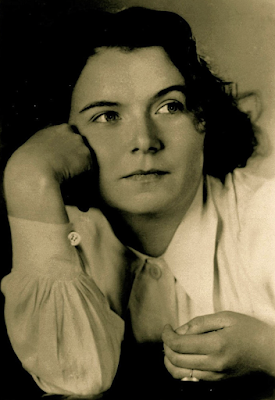On my way to the art show in Pittsburgh, PA highlighting
the Russian imprisonment of schoolteacher Marc Fogel over marijuana, I happened to spot this sign honoring the American Federation of Musicians, with Tokin' Woman Mary Lou Williams getting top billing.
The stunning 2015 documentary Mary Lou Williams: The Lady Who Swings the Band, now viewable on Kanopy via your local public library, presents the huge talent, prominence, and lack of acceptance of this pioneer jazz pianist, arranger and composer.
Born Mary Elfrieda Scruggs in Atlanta, Mary Lou Williams grew up in Pittsburgh, where she taught herself to play the piano at the age of four and began playing publicly two years later, to much acclaim and popularity. In 1924 she began touring on the Orpheum Circuit and the following year she played with Duke Ellington and the Washingtonians.
In 1930 Williams traveled to Chicago and cut her first solo record, "Drag 'Em" and "Night Life," which was a national success. Soon she was playing solo gigs and working as a freelance writer arranger for such noteworthy names as Earl Hines and Tommy Dorsey.
In 1937 she wrote "Roll 'Em” (1937) for Very Important Pothead
Benny Goodman, which was recorded for Goodman’s “When Buddhah Smiles” LP, featuring Fletcher Henderson and VIP
Gene Krupa on drums. All told, she wrote more than 350 compositions.
The documentary says Williams broke up with her first husband over her infidelity, but
Morning Glory, a biography of Williams by Linda Dahl (University of California Press, 1999), says it was over "the taste she had acquired for marijuana." Dahl wrote, "Kansas City was a major railroad hub of the nation, distributing drugs along with corn and wheat, so it was easily available in the nightclubs there." Unable to handle liquor, pot "agreed with her."
John said Mary Lou had been turned onto reefer by a fellow bandmate in the Clouds of Joy, a group that recorded Earl Thompson's song about reefer, "All the Jive Is Gone" in 1936. Williams "found marijuana calming, useful for reflecting and relaxing at times" (Dahl). By 1941 Mary had developed a lifestyle that disdained alcohol and developed "a taste for gambling, marijuana, and men."
Making the transition from stride piano to bebop, Williams played regularly at the famous Café Society in New York City, started a weekly radio show called "Mary Lou Williams's Piano Workshop" on WNEW, and began mentoring and collaborating with many younger bebop musicians, most notably Dizzy Gillespie and
Thelonious Monk.
Barney Josephson fired her for smoking pot one night at Café Uptown, even though as Doc Cheatham put it, "everyone in that group smoked pot. They had a little room off the bandstand and some, including Mary Lou and
Billie [Holiday], would smoke pot in there. They would put me outside the door in a chair smoking a pipe that would cover the fumes of the pot."












